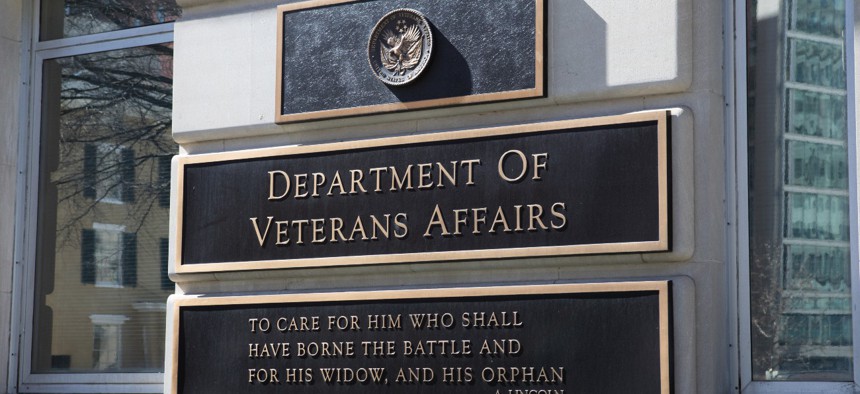
By Mark Van Scyoc / Shutterstock.com
VA Asks for Broader Definition of Management in What Union Fears Is an Effort to Purge Members
Union officials said they fear the department’s request to the Federal Labor Relations Authority, combined with President Trump’s controversial Schedule F executive order, could amount to a last-minute effort to strip federal workers of collective bargaining rights.
The Veterans Affairs Department has asked the agency that governs labor rules at federal agencies to expand its definition of “management officials,” a decision that could lead to a purge of potentially thousands of federal employees from their bargaining units.
On Oct. 16, VA Assistant Secretary for Human Resources and Administration Daniel Sitterly filed a request for a general statement of policy or guidance with the Federal Labor Relations Authority on the definition of “management official” as it relates to determining who may be included in a bargaining unit. Although the FLRA traditionally has avoided making general policy statements in favor of establishing precedent in concrete disputes, the agency’s current Republican majority has abandoned that ethos, making a number of high profile changes to limit how unions can negotiate in recent months.
In the VA’s request, the department argues that the FLRA’s definition of “management officials” that should be excluded from union representation is too narrow when compared with the “plain language” of the statute governing federal collective bargaining.
“On its face, the definition of ‘management official’ would appear to cover a broader category of employees given that there are three types of duties and responsibilities that would allow an individual to fall under the definition—those whose duties and responsibilities have them either ‘formulate,’ ‘determine,’ or ‘influence’ policies of the agency,” Sitterly wrote. “However, despite the broad language utilized in the statute, the authority caselaw on the subject of ‘management officials’ within the context of bargaining unit determinations has defined the term to require employees to essentially serve in leadership roles to be excluded from the unit.”
The FLRA has yet to take any action related to the request. But union officials said they fear that it could prove to be a harbinger of an effort to remove federal workers from their bargaining units before President-elect Biden takes office on Jan. 20, particularly when considered alongside two other recent developments: President Trump’s controversial executive order establishing a new Schedule F job classification in the excepted service that could make tens of thousands of federal workers at-will employees, and the Nov. 4 FLRA decision to decertify the National Association of Immigration Judges.
Cathie McQuiston, deputy general counsel for the American Federation of Government Employees, whose union represents VA workers, said she sees a common through-line across all three decisions: a focus on employees’ role in policymaking and implementation.
“Schedule F and the immigration judges decision are sort of hand-in-glove with one another,” McQuiston said. “Basically the description of the types of duties they want to move to Schedule F are the people who they would like to [pull out of unions with] the management official exclusion. In the judges decision, you had the authority act first and now you have to assume that the Justice Department will designate those people to go into Schedule F and then they can just fire them. They’re coming at the same issue in opposite ways.”
McQuiston argued that the administration is trying to expand the definition of management officials well beyond what Congress intended to include anyone involved in the policy formulation or implementation process.
“Historically, [the management official exception] is the most difficult way to remove people [from unions],” she said. “Most people in bargaining units don’t actually have the authority to implement agency policies, because they go through 13 levels of review and require sign off at every level, and all that kind of stuff. They’re just not management under the definition of the statute.”
It is unclear whether the FLRA can move quickly enough to take action on the VA’s request ahead of Biden’s inauguration on Jan. 20. Experts have said statements of policy from the agency are relatively easy to roll back when compared with caselaw established through concrete bargaining disputes, although it may take time for the White House to nominate a Democratic chair of the board as well as a replacement for Republican Member James Abbott, whose term expired in July and is currently serving in holdover status.







